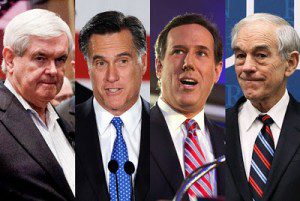Months after its date became an issue and 10 days after it turned the state into the center of the political world, Florida’s presidential primary comes to a head today as voters go to the polls.

And Republican leaders are saying that the contest could ultimately decide which one of the candidates wins the nomination — just what legislators wanted when they set up a committee last year that upended the GOP’s plans for a carefully orchestrated voting calendar.
As the candidates sprinted across the state Monday in their last chance to sway those voters who haven’t already cast a ballot, polls showed former Massachusetts Gov. Mitt Romney opening up a double-digit lead against former U.S. House Speaker Newt Gingrich. Former Pennsylvania Sen. Rick Santorum and Texas Congressman Ron Paul, who has all but ignored Florida in pursuit of later states, were even farther behind.
Romney used two strong debate performances and an onslaught of ads in Florida to try to counter Gingrich’s momentum after the speaker shook up the race by thumping Romney in South Carolina. By Monday, Gingrich supporters were already trying to downplay expectations for Gingrich, who vowed to press on no matter what happens today.
“If he has a respectable showing, I think he’s still a viable candidate,” said Sen. Thad Altman, a Melbourne Republican who supports Gingrich. “I think it’s important that he has a good showing here, but I don’t think he has to win.”
A respectable showing, Altman said, would be one that put the former speaker within 10 points of Romney — though Gingrich wasn’t out of the race for Florida even with the daunting margin, Altman said.
“If look you at the polls of the past primaries, Newt’s run stronger than the polls indicated and Romney ran a lot weaker,” he said.
Romney supporters were also looking to tamp down any emerging story lines that the onetime front-runner needed a big win in Florida after a long list of polls showed him putting ever more distance between himself and the rest of the pack.
“Any win is a win, okay?” said Sen. Steve Wise, a Republican from Jacksonville, a Romney stronghold.
Following a debate in Jacksonville Thursday night, in which Romney was seen as the winner, adviser Eric Fehrnstrom also tried to quiet talk that a win in Florida could prove to be a knockout punch for Romney, who has already won in New Hampshire and is the best-funded candidate in the race.
“The nomination process doesn’t end on the 31st of January,” he said. “It keeps going.”
Florida Republicans coming off a bruising battle to put the state in the limelight were eager to paint a different narrative. Last year, facing the prospect of sanctions from the national Republican Party for the Jan. 31 primary date, GOP lawmakers cobbled together a committee to establish the date of the presidential primary. The panel decided to go with Jan. 31 anyway.
That prompted the national party to strip Republicans of half of their delegates to the GOP convention, set to be held in Tampa.
“No one can argue that that has not concentrated extraordinary focus, emphasis and potentially … decisiveness in terms of the impact of Floridian voters’ voices,” said state House Speaker Dean Cannon, R-Winter Park. Cannon has remained neutral since his first choice, Texas Gov. Rick Perry, dropped out of the race.
Lenny Curry, chairman of the state Republican Party, was more reserved.
“I’d rather that we didn’t lose half of our delegates, but this is where we are, and it is all about Florida,” he said. “So some will argue that it was worth it.”
By Brandon Larrabee


